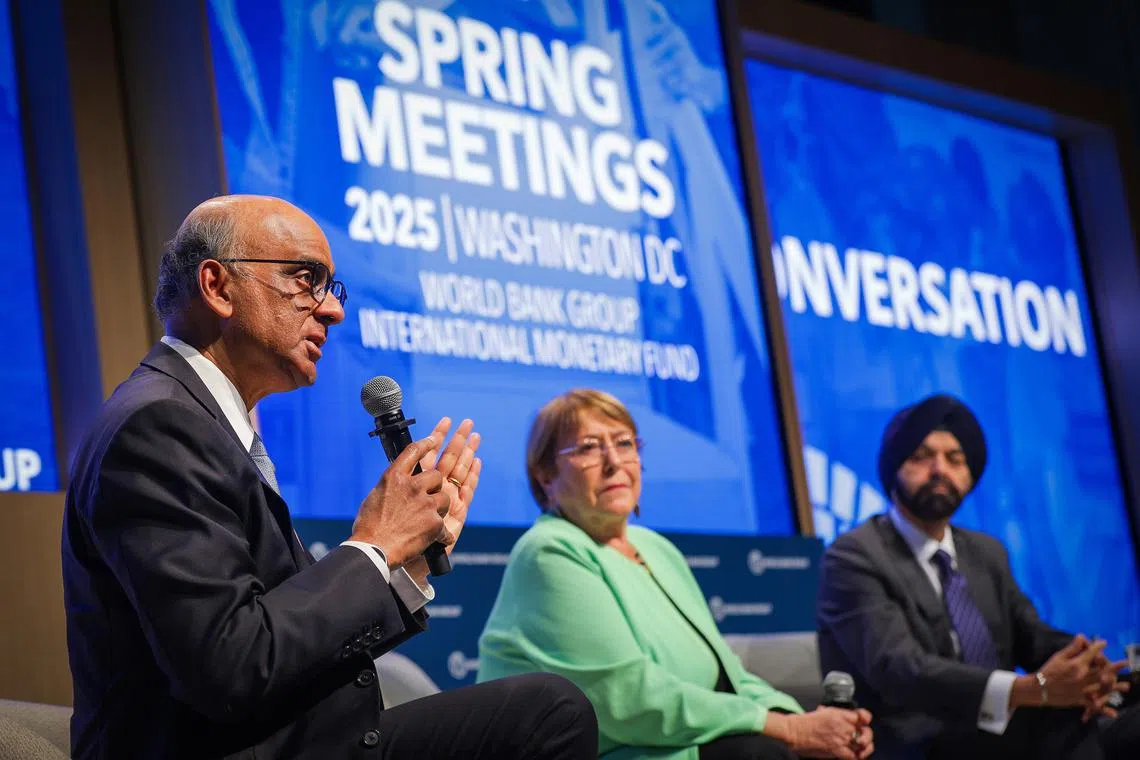Grow the pie instead of fighting over a lost slice: President Tharman at World Bank panel
Sign up now: Get ST's newsletters delivered to your inbox

President Tharman Shanmugaratnam said at a World Bank panel discussion on jobs that a billion people may be added to the global middle class by 2030.
PHOTO: MDDI
SINGAPORE – “We live in a world where the talk is about who’s taking my slice of the pie or how I can get back the slice I believe is mine,” said President Tharman Shanmugaratnam in response to a question on job creation amid uncertain times.
But leaders should take a step back to understand the larger context behind this jostling for growth.
“Starting from the global financial crisis, through the 2010s and even more so in the 2020s, the pie has been growing more slowly,” he added, speaking at a panel discussion on jobs in Washington on April 22. President Tharman is in the US on a working visit
“It’s only natural that when the pie grows more slowly, the arguments get sharper about who’s taking whose slice or the larger slice,” Mr Tharman said.
“Our real challenge, and our ambition, has to be to grow the pie... and grow the middle class especially,” he emphasised, highlighting that the world faces the prospect of expanding this segment by one billion people in the next five years, largely in the developing world.
Mr Tharman’s remarks came a day after global growth forecasts for 2025 were slashed
The same report showed that emerging economies in Asia, sub-Saharan Africa, the Middle East and Central Asia, along with India and China, retained higher-than-average growth projections.
Meanwhile, Singapore’s Ministry of Trade and Industry in mid-April cut the country’s growth projection to zero to 2 per cent
“There are a lot of legs left in... manufacturing and exporting to the world”, which offer high-productivity growth and a stronger skills ladder, one reason it remains the core of economic development, Mr Tharman said.
Countries could also exploit the potential of regionalisation and the lowering of trade barriers between regional blocs including Asean-EU, EU-Africa, and the Comprehensive and Progressive Agreement for Trans-Pacific Partnership countries and the EU, he noted.
When asked whether artificial intelligence (AI) is more likely to complement or displace labour, he highlighted the prospects of leveraging AI to boost productivity and touched on using “small AI” to improve productivity in every sector.
In agriculture, for instance, AI can help in maintaining soil health, in using the right amount of water and the right type of fertiliser at the right time, and aid in moving people out of the trap of low-productivity agriculture.
“How things play out also depends on what we do now – in that whole stack of education and training, starting from the earliest years through a person’s career, (and) what we do to use artificial intelligence,” Mr Tharman said.
Lin Suling is senior columnist at The Straits Times’ foreign desk, covering global affairs, geopolitics and key developments in Asia.



